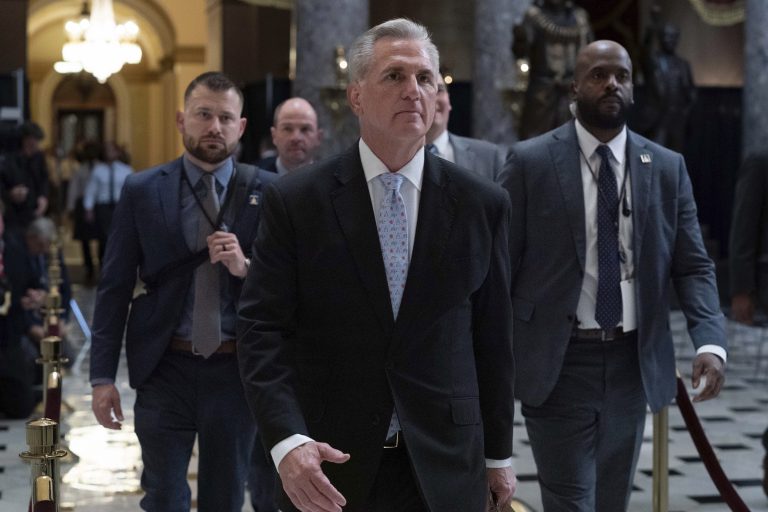House Republicans left Washington on Friday for a week feeling elated about their massive debt bill they muscled through despite the thinnest of narrow margins. Just don’t call it a breakthrough.
Speaker Kevin McCarthy’s fiscal standoff with President Joe Biden remains as deadlocked as ever, with the GOP demanding steep spending cuts in exchange for lifting the nation’s borrowing limit to stop a dangerous debt default. And that impasse might not ease until one or both parties start feeling more pressure to bend as Congress veers closer to the edge of fiscal calamity later this spring.
“This is one of those things where you have to get really, uncomfortably close — unfortunately — to the deadline before people really roll up their spikes and decide they’re going to start to move in their position,” Rep. Pramila Jayapal (D-Wash.) said.
While Republicans believed the plan they passed Wednesday would force Biden to the table, the White House and most congressional Democrats have brushed it off and made clear they won’t entertain the GOP’s demands. Instead, both sides have retreated further into their corners, with each party planning to spend the coming days talking almost entirely to its respective base voters.
“I think we in the House ought to message the hell out of it,” Rep. Chip Roy (R-Texas) said, warning that Democrats would “make false claims” about their bill: “We need to be on offense on the message.”
As for the next steps, Roy said: “The ball’s in the president’s court and the Senate court.”
Roy is far from alone in the GOP conference in arguing that the problem is no longer in their hands, putting the blame squarely on Democrats’ shoulders. Most Republican lawmakers insist they have little anxiety about the increasingly rattled nerves on Wall Street as a dysfunctional Congress barrels closer toward this summer’s drop-dead debt limit date.
“Every day that he refuses to negotiate, he is putting the U.S. economy at risk,” Rep. Mario Diaz-Balart (R-Fla.) said. “The next move is on Biden.”
Top Democrats have revealed little about their next steps. While Senate Majority Leader Chuck Schumer (D-N.Y.) has called on Republicans to work with him on a clean debt plan, it’s unclear if his caucus would even unite to vote in favor of one. Sen. Joe Manchin (D-W.Va.), specifically, has put the onus on Biden to meet with McCarthy.
And at least some in the party are getting nervous: “We all should be getting anxious,” Rep. Elissa Slotkin (D-Mich.) said.
All the focus next week will be on the Senate, which will return to Washington facing the pressure from House Republicans — and possibly from the Treasury Department. Officials there are expected sometime in the coming days to update the public on the “X date,” before which Congress will need to pass a debt limit lift to avoid default.
“I think once we have that date with clarity … then we’ll know with some urgency our timeframe for dealing with this challenge,” House Minority Leader Hakeem Jeffries (D-N.Y.) told reporters Friday, adding: “Understand that this is a manufactured crisis that extreme MAGA Republicans are foisting on the American people.”
In the meantime, Democrats plan to spend their time turning the GOP’s debt plan into campaign fodder, betting that fresh attacks on Republican plans to slash spending on programs like food stamps and Medicaid will hurt in the swing districts they need to flip next November.
Many of the Republicans currently holding those battleground seats, however, say they aren’t sweating their yes votes.
Rep. Nick LaLota (R-N.Y.), who flipped a purple Long Island seat last fall, said he recently did a tele-town hall with over 13,000 callers where he asked each person to weigh in on whether they supported his position on debt: Raising the limit, but with some cutbacks to federal spending, including Covid aid.
“Three to one, [constituents] agreed with my position,” LaLota said Friday.
Ever since House Republicans passed its plan on Wednesday, both parties have resorted to finger-pointing to try to pin blame if negotiations go south.
Still, the GOP bill remains a win for McCarthy, who faced a steep climb as he wrangled a deal among the disparate wings of his party with only a handful of votes to spare. By working closely with conservatives to craft a plan packed with right-flank priorities, the speaker achieved near-total unity in his bid to kick off negotiations with Biden.
Even so, White House officials have emphasized in conversations with Democratic congressional leaders the importance of staying aligned on Biden’s no-negotiation stance. The president’s team is clearly betting that it still holds the stronger hand in the debt ceiling standoff; the White House reacted to the House GOP’s bill by issuing a flurry of statements and analyses detailing the damage it would do to the economy and popular programs.
While Biden administration officials have explored a variety of potential alternative options for averting default, there is skepticism that any would be workable — and none are seen as preferable to Congress simply voting to raise the debt ceiling.
The House Republican pitch that would raise the debt limit by $1.5 trillion, or through March of next year — whichever comes first — setting up another fight with the White House next year. In particular, Republicans are proudest of the bill’s slashes to federal spending, including $130 billion in the upcoming fiscal year that would effectively return discretionary spending totals to nearly the same level as two years ago.
But the task is far from done, and McCarthy still could be squeezed yet by his own party.
Some members of the conservative Freedom Caucus are arguing that the California Republican should refuse to negotiate down at all as Democrats decide on their counter — a position that other Republicans in the conference view as irrational.
“I don’t do red lines because there might be a different price that I might want for something, right? Put a border bill on there, change the length and times. There’s always a way to come up with something that will actually be good for the country,” Roy said of the potentially negotiable items.
“Go ahead, Mr. President,” he added. “Go ahead, Sen. Schumer.”
Adam Cancryn and Nicholas Wu contributed to this report.



